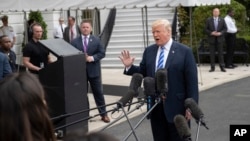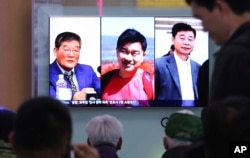Pressed by reporters Friday on Air Force One about his upcoming summit with North Korean leader, U.S. President Donald Trump declined to reveal specifics.
"It will be very soon. I have the date. I have the location," said Trump. "It's all agreed to."
Before leaving Washington for a one-day visit to Dallas, Texas, the president indicated the location and date for the historic meeting had been confirmed with North Korean authorities.
On the White House South Lawn, the president said the U.S. and North Korean governments were in constant contact and discussions also had included the release of three Americans held by Pyongyang.
Tony Kim and Kim Hak Song were teaching at the Pyongyang University of Science and Technology, the only private university in the country. They were separately detained in 2017 and accused of participating in anti-state activities and trying to overthrow the government.
The third detainee, Kim Dong Chul, was arrested in Rason on the northeast tip of North Korea in October 2015. He was sentenced to 10 years in prison with hard labor in 2016 after being convicted of espionage.
The men are expected to be released as soon as Saturday, according to South Korean sources quoted by the Yonhap news agency in Seoul.
Former New York Mayor Rudy Giuliani, a new member of Trump's legal team, said earlier in the week that the Americans were expected to be freed Thursday from a labor camp.
Later in the day, in remarks in Dallas to the annual convention of the National Rifle Association, Trump stated that because "we're really doing well with North Korea," he would refrain from uttering negative rhetoric about the communist state and its leader, whom he had previously referred to as "Little Rocket Man." But the president credited his tough language, despite admonitions from critics not to stoke the anger of potential adversaries, with bringing the North Koreans to the negotiating table.
"You know what gets you nuclear war? Weakness. That's what gets you nuclear war," Trump declared.
The White House said Friday that South Korean President Moon Jae-in will meet with Trump in Washington on May 22 to discuss the upcoming Trump-Kim summit. This will be the third time that Trump and Moon have met to coordinate developments on the Korean Peninsula.
At 11:30 Friday night North Korea moved its clocks ahead a half hour, putting the country on the same time as South Korea. North Korean leader Kim Jong Un had announced the plan to unify the time zones as a step toward unification of the peninsula when he met with Moon in Panmunjom last month.
Withdrawal remarks rattle Seoul
Amid preparations for the Trump-Kim summit, South Korean officials have been rattled by reports the U.S. president is considering withdrawing American forces from the peninsula if his talks with Kim go well.
Trump told reporters Friday that "at some point into the future, I would like to save the money" spent on keeping the U.S. military in South Korea, but the president emphasized that "troops are not on the table" for his talks with Kim.
Earlier in the day, national security adviser John Bolton, responding to a New York Times report, termed it "utter nonsense. The president has not asked the Pentagon to provide options for reducing American forces stationed in South Korea."
The Defense Department also said in a statement that the newspaper's story was false.
Trump has stated that the United States will continue to apply maximum pressure on Pyongyang until the country denuclearizes, which he has defined as "I want them to get rid of their nukes."
South Korean officials say Kim told them he would abandon his nuclear weapons if the United States officially ended the Korean War.
The North and the United States were among the signatories to a formal cessation of hostilities in 1953, known as an armistice.
Many analysts are skeptical Kim will agree to abandon his nuclear weapons and ballistic missiles merely in exchange for a peace treaty.
"A common definition of denuclearization" would be helpful before a meeting, said Tara O, an adjunct fellow at the Pacific Forum and author of The Collapse of North Korea. "Otherwise, there would be surprises."
O, a retired U.S. Air Force lieutenant colonel, told VOA News that Kim and his generals view denuclearization of the Korean Peninsula as including a withdrawal of U.S. troops and an end to the U.S.-South Korean alliance in order to remove the American nuclear umbrella and the joint military capability from the peninsula.


